Shark Week's Over, But the Fun Has Just Started.
It's been a couple weeks since we've posted an Attention Lab wrap-up, and it's been because we've been so busy prepping for and campaigning during Shark Week. You may have noticed things got a little sharky over the past couple weeks. It's pretty safe to say that the annual week-long special on the Discovery Channel was all we were focusing on.
You can read the whole account of what we did below. Suffice it to say, we had a great time and learned a lot.
What'd We Learn from Shark Week 2012?
The conversation is too big to chomp
Shark Week is a time when a bunch of shark fanatics jump online to say "wooo!". There's a lot of noise in the conversation - many people jump on facebook or twitter just to say "shark week!" and that's it. But there are a lot of people who are truly engaged and want to learn more about sharks. We shared a bunch of conservation-minded content and we were happy to see a lot of people responding to say things like "Shark finning? I didn't know that people did that - that's horrible!" But at the end of the day, the conversation is so big that it's hard to register at a big scale. (See "Other Results" below for more.)
Meet badassery with badassery
It's not unique for sharks - we know that image macros sail well in social media. We created several for Shark Week (see "Upwell's Campaign Efforts" below), and learned that the best way to tap into the popularity of Shark Week was to capitalize on the badassery of sharks. Using inspirational photos of shark attack survivors with lost legs, and font styles that mimic Discovery's own marketing campaign, we were able to create images that slid into the Shark Week conversation like butter.
Coordination makes us all better shark savers.
Our sharkinars helped us understand what the large majority of the universe of conservation content would look, feel and sound like during Shark Week. We set up our monitoring systems to listen to these campaigns and tried our very best to amplify and create the best social content that would bring attention to these campaigns. We sent out a survey to the individuals and organizations who registered for our sharkinars, and the sentiment of the responses we've received so far is nearly unanimous: people were excited to hear about and have an opportunity to amplify each other's campaigns, and discuss strategies to get more people excited about shark conservation. We believe that this up-front collaboration and communication was critical to helping the conservation chatter get bigger this year (which it did... more in Other Results below.)
Upwell's Sharkinars & Shark Week Toolkit
We started a couple weeks ago by analyzing the online Shark Week conversation from previous years. That analysis can be found on our blog here.
The week of August 6, we held two "sharkinars," behind-the-scenes virtual gatherings of shark advocates who wanted to leverage Shark Week to bring attention to conservation efforts online.
On the sharkinars, we learned about all the awesome campaigns that were running during Shark Week, and encouraged our Tide Report subscribers and Twitter followers to amplify those campaigns.
Sharkinar participants also let Upwell know what kinds of tools and resources would help them, and we developed a toolkit to respond to those requests. The toolkit included an incredible mythbusting cheat sheet for rapidly responding to shark myths on Twitter, as well as some tips for using Twitter and Facebook effectively to spread the shark saving word.
Upwell's Campaign Efforts
Upwell developed some content to help amplify the efforts of the conservation community.
Livetweeting Shark Week
On Sunday, Monday and Wednesday, we livetweeted shark week shows with interesting facts. We used our own mythbusting tool to correct myths, and we amplified great tweets. We looked specifically for people with influence that were participating in the conversation (primarily using the built-in Klout filter in Hootsuite). We also amplified great tweets that used the #savesharks hashtag. We primarily used our image macros (detailed below) as content for tweets.
Our most successful livetweeting came on Wednesday night, during Shark Fight - the Shark Week special on shark attack survivors that was produced in conjunction with Pew. Matt Fitzgerald on our team took the lead on that. His most successful tweet resulted in 43 retweets - a sign that if you've got a compelling message, it doesn't hurt to ask people to retweet:
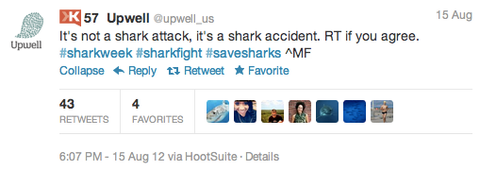
Reframing shark attacks via livetweeting. Totally doable.
We also sent an email to our Tide Report subscribers on Thursday urging them to do one final push on the Thunderclap. There were 16 tweets that went out after we sent our message, reaching about 11,000 people. While we weren't able to push the Thunderclap reach to 2 million, we sure did try.
Image Macros
We put together a series of image macros (images with overlaid text - our favorite way to inspire engagement!) around Shark Week. We shared all of these images on a few channels - our own Facebook page, our Twitter feed, our Tide Reports, and the Fuck Yeah Sharks Tumblr.
A side note about FYS: I acquired Fuck Yeah Sharks a month or two ago from the two guys that created it back in 2010. When Nick Weidinger alerted me that they had posted that they were ready to hand it off to a conservation group, I decided to make it my mission to get the reins. All it took was a few emails, some moxie, and a pizza delivery to their home in Chicago. The Tumblr has nearly 20,000 followers that think sharks are pretty wicked cool. I am continuing to post funny and sensational pictures to the tumblr (since that was the type of content that drew those thousands of followers), and peppering in conservation content. It's an experiment that is so far going quite well. Conservation content is getting as much or more engagement than other content.
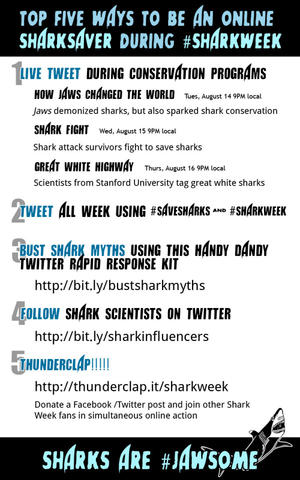
Giving people the tools to be shark savers.
This is one of the first images we put together, to help educate people who care about sharks about how they can effectively use social media during shark week. On Fuck Yeah Sharks, the image has received 61 reposts and ♥s. On Facebook, it received 5 shares and 10 likes. There were 8 tweets directing to the image, and it received 165 views at its original link.
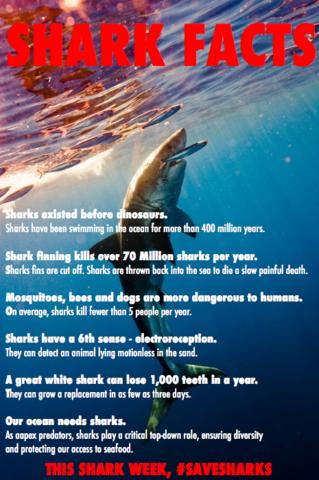
Yes, we know there are typos.
Who doesn't like some facts? We threw together this image (rather quickly, hence the typos, whoops. good thing the internet doesn't seem to care) to share some interesting facts about sharks alongside some facts about human impact on sharks worldwide. We put in #savesharks to try to amplify the use of the hashtag. The image has had 407 views at its original link. There are 47 tweets of the image, 30 of which are retweets of Upwell's tweets. The most successful (most retweeted) tweets were ones that called out specific facts featured in the image. On Fuck Yeah Sharks, the image got 492 reposts and ♥s. We posted it to facebook, and it received 46 shares and 39 likes (another instance where shares were higher than likes - a sign of a very engaging piece of content!). It was also shared on the Give a Shit About Oceans fan page (which we are now in regular contact with). Their post led to 16 shares, 35 likes and 5 comments.
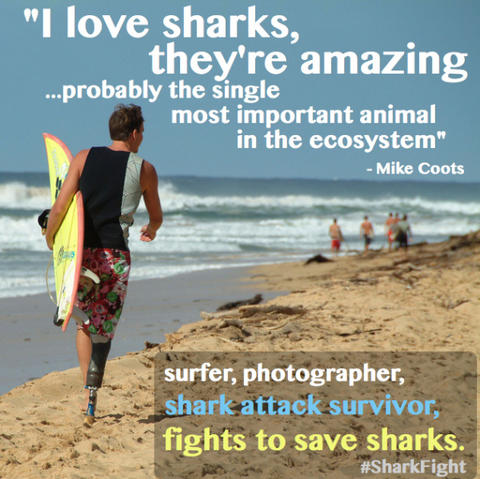
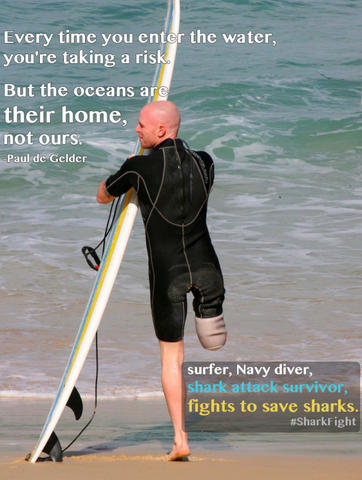
Getting back in the water - now that's pretty badass.
We also made these two images to help amplify the Pew Environment campaign around the Shark Fight show.
The Mike Coots image has had 609 views and 67 tweets (at its original link). This includes 39 retweets. There were over 70,000 impressions on Twitter. The Fuck Yeah Sharks post has 168 notes (a combination of reposts and ♥s). This image was most successful on facebook. It was shared over 650 times, including by many of our friends, like Greenpeace USA (resulting in 256 shares, 823 likes and 23 comments), Give a Shit About Oceans (216 shares, 87 likes, 7 comments) Marine Conservation Institute (46 shares and 95 likes), John Sexton (81 shares, 16 likes, 7 comments), Alisa Schwartz (46 shares, 17 likes).
The Paul de Gelder image has had 205 views at its original link. Upwell shared the image on twitter and got 16 retweets and 2 faves. On Fuck Yeah Sharks, the image received 256 reposts and ♥s.
Other Upwell campaigning efforts
Upwell also did some direct outreach to help the shark week message spread to new audiences. We reached out to fellow "Up" - Upworthy via facebook, to encourage them to spread the shark-saving word through their multiple platforms. They responded with thanks and ended up posting about Shark Week on their website with a Discovery infographic. That post led to 25 tweets.
We also sent this remixed & auto-tuned Shark Week video from Symphony of Science to Mashable, which they posted on their site on August 19. That post has received 884 tweets and 94 facebook likes.
Other Results
Shark Defenders let us know that thanks in part to our amplification and coordination efforts, they increased their number of Twitter followers by 14% during the week!
Thanks to
— Shark Defenders (@sharkdefenders) August 20, 2012@upwell_us and others, our followers went up 14% during#SharkWeek.We promise to spend the other 51 weeks defending sharks, too
Overall, the community of conservationists Upwell engaged with for Shark Week was able to greatly increase its voice over that same period. Our first-pass analysis of social data from Shark Week shows that while the conservation community's content and conversation was a relatively small piece of the overall Shark Week conversation, we were able to greatly increase our collective share over last year.
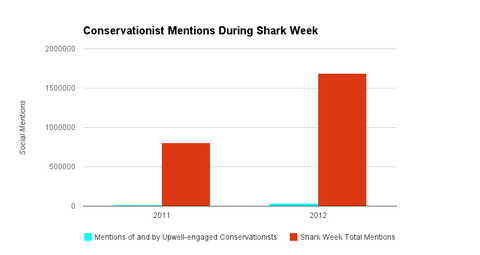
Year-over-year growth of social mentions of Upwell-engaged conservationists (light blue) and Shark Week (red).
The light blue line in the above graph represents all social mentions of and by conservationist individuals and organizations active during Shark Week (technically Aug. 11 - 17, a day prior to and a day after Shark Week premiere programming). This graph shows us that Upwell-engaged conservationists' share of the overall shark conversation was rather limited. The majority of Shark Week conversation remained focused on celebratory "Yay Sharks!” and “Yay Shark Week!" posts and tweets.
However, when we drill down, we can understand a better story.
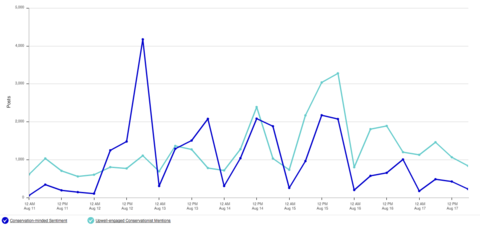
Social mentions of Upwell's shark conservation-sentiment keyword set (dark blue - 28,002 total mentions) vs. social mentions of Upwell-engaged conservationists (light blue - 36,392 total mentions)
Taking out all mentions of Shark Week, we are able to focus in on that light blue line of shark conservationists (formal and informal). Here, we've graphed that conversation alongside all social mentions that had a conservation sentiment. We pulled out the conservation sentiment by identifying a set of keywords that relate to saving sharks (e.g., conserve, endangered, save sharks, etc.). What this graph shows us is that the network of individuals and organizations that Upwell engaged represents the large majority of the conservation-oriented conversation. Our collective network was a veritable who’s who of shark conservation and engagement. We have met the network, and it is all of us.
The four biggest spikes represented in the above graph represent (left to right):
- Unrelated social mentions containing the word “understand” as Shark Week began, e.g. “I dont understand why so many people get excited for shark week” [8/12]
- Leonardo DiCaprio tweet referencing Oceana [8/14]
- Shark Week Conservation Thunderclap [8/15]
- Shark Fight premiere and survivor live-tweet [8/15]
By comparing the conversation generated by our informal conservationist network this year to last year, we are able to celebrate one more thing.
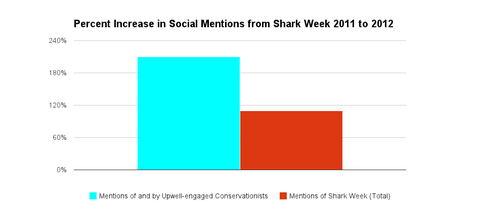
Percent increase in Shark Week social mentions from 2011 to 2012: Upwell-engaged Conservationists (+210%) vs Shark Week (+109%)
While the overall Shark Week conversation increased by 109% percent, the shark conservation community's share of that conversation increased by 210% percent. This shows us that the shark conservation conversation is growing at a more rapid pace than the overall shark week conversation! This is great news, and bodes well for not only next year's Shark Week, but all the weeks in between.
Last but not least, ponder that fact that on a regular, non-Shark-Week day, of every 1000 social mentions of sharks, only one, a single, solitary one, is about saving them. During Shark Week 2012, on just one day, the ad-hoc conservationist network of shark lovers spiked social mentions a whopping 7,000% - and we saw comparable data all week.
Add a comment